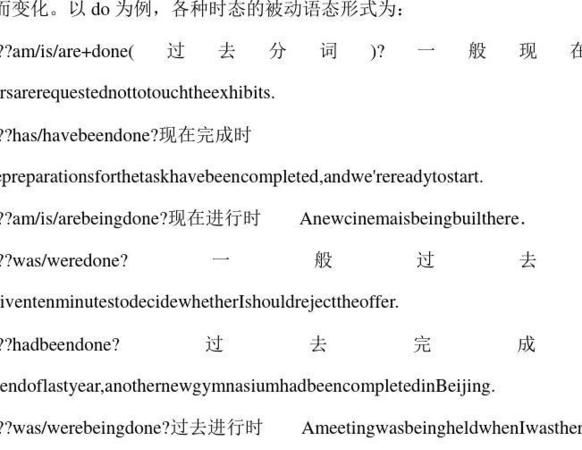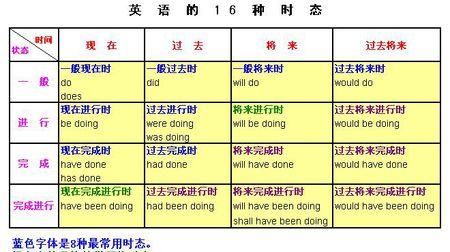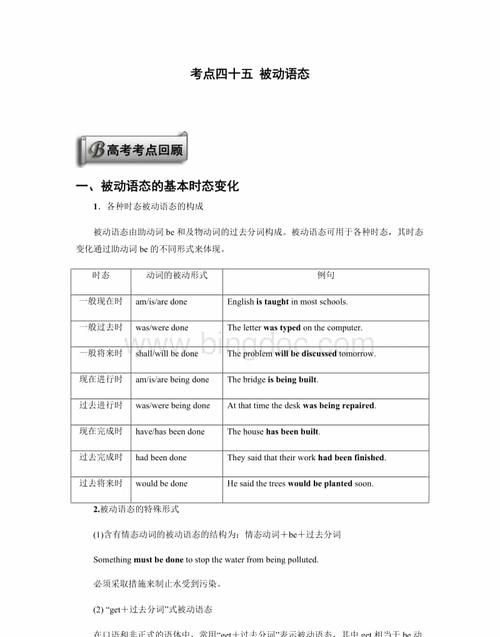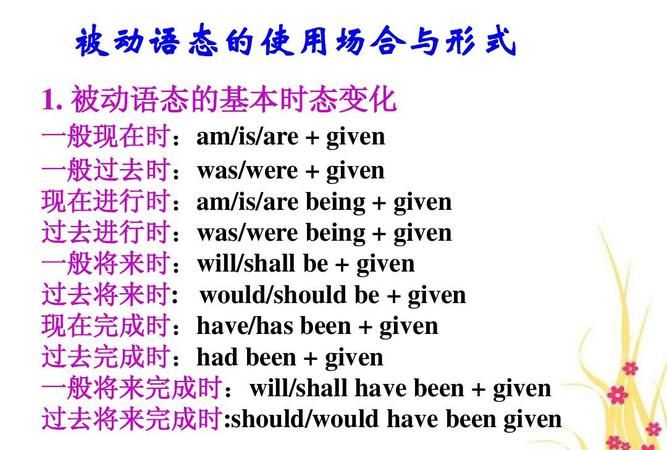本文目录
英语中八种时态的被动语态句型结构是什么
被动语态的时态由被动结构“be+过去分词”中的动词be来体现,其基本结构和用法如下:(1)一般现在时的被动语态:am
[is,
are]+过去分词English
is
taught
in
our
school.
我们学校学英语。We
are
taken
good
care
of
at
school.
我们在学校受到很好的照顾。(2)
一般过去时的被动语态:was
[were]+过去分词He
was
taken
to
the
police
station.
他被带到了警察局。The
house
was
built
ten
years
ago.
这座房子是10年前建的。(3)
一般将来时的被动语态:will
be+过去分词A
new
building
will
be
built
here
soon.
不久这里将建一栋新楼。The
meeting
will
be
held
at
two
this
afternoon.
会议将于今天下午2点举行。(4)
现在完成时的被动语态:have
[has]been+过去分词All
the
work
has
been
done
now.
所有的工作现在都做好了。Have
the
letters
been
posted?
信都寄了吗?(5)
过去完成时的被动语态:had
been+过去分词He
said
the
work
had
been
finished.
他说工作已完成了。(6)
现在进行时的被动语态:am
[is,
are]
being+过去分词My
watch
is
being
repaired
by
him.
我的表正在由他修理。The
plan
is
now
being
discussed.
计划现在正在讨论。(7)
过去进行时的被动语态:was
[were]
being+过去分词He
said
that
the
man
was
being
operated
on.
他说那个人正在动手术。He
told
me
that
a
new
station
was
being
built.
他说正在修建一个新车站。(8)
过去将来时的被动语态:would
be+过去分词He
said
that
the
meeting
would
be
held
next
week.
他说会议将于下周举于。

过去将来时的被动语态结构
过去将来时的被动语态基本语法
基本形式:(1)would + be + 动词的过去分词(2)was / were +going to be + 动词的过去分词。eg. I knew the work would be finished by 5:00 PM。
我们通过例句来感受下被动态:
(1)I knew John would finish the work by 5:00 PM. (Active) 我知道约翰会在5点前结束工作。(主动)
I knew the work would be finished by 5:00 PM. (Passive) 我知道工作会结束于5点之前。(被动)
(2)I thought Sally was going to make a beautiful dinner. (Active) 我想萨里会去做一顿丰盛的晚餐。(主动)
I thought a beautiful dinner was going to be made by Sally. (Passive) 我想一顿丰盛的晚餐会出自萨里之手。(被动)
(3)I believed that Jack was going to write a letter to Tom. (Active) 我相信杰克会给汤姆写信的。(主动)
I believed that a letter was going to be written to Tom by Jack. (Passive) 我相信有封信会写自杰克之手并被交给汤姆。(被动)
(4)I knew that my sister would buy a house. (Active) 我知道我姐姐要买房了。(主动)
I knew that a house would be bought by my sister. (Passive) 我知道有一所房子要被我姐姐买下了。(被动)
希望能让你明白这个意思,对你有所帮助。

现在进行时和过去进行时的被动语态
1.Was
the
dog
being
taken
a
bath
at
this
time
yesterday?(过去进行时的被动语态)
2.
Will
our
teaching
building
be
built
next
year?(一般将来时的被动语态)
其他没看明白

被动语态语法知识点
1. 被动语态的构成与用法
英语的语态有主动语态和被动语态两种。决定动词用主动语态还是被动语态主要看动词和主语的关系。如果主语是动作的执行者,也就是说它们是主动关系,此时动词用主动语态;如果主语是动作的承受者,也就是说它们是被动关系,此时动词则用被动语态。英语的被动语态由“助动词be+过去分词”构成,其中be有时态、人称和数的变化。如:
English is taught in most schools. 大多数学校都教英语。
The children are not allowed (permitted) to play on the grass. 孩子们不允许在草地上玩耍。
After the accident, the injured were taken to hospital. 事故发生之后受伤的人被送往医院急救。
2. 九种时态的被动语态
各种时态的被动语态
被动语态的构成
be
过去分词
1
一般现在时的被动语态
am / is / are
过去分词
2
一般过去时的被动语态
was / were
过去分词
3
现在进行时的被动语态
am / is / are +being
过去分词
4
过去进行时的被动语态
was / were +being
过去分词
5
现在完成时的被动语态
have / has been
过去分词
6
过去完成时的被动语态
had been
过去分词
7
将来完成时的被动语态
will / shall have been
过去分词
8
一般将来时的被动语态
will / shall be
过去分词
9
过去将来时的被动语态
would / should be
过去分词
请看以下用例:
We are given a lot of homework to do. 我们有很多作业要做。
They were given a warm send-off. 他们受到热烈的欢送。
I think we are being followed. 我想有人在跟踪我们。
They told me that the case was being investigated. 他们告诉我案子正在调查。
The documents for which they were searching have been recovered. 他们找寻的文件已找到了。
He asked if Mary had been sent to hospital. 他问玛丽是否已被送进医院。
Check carefully, so any mistakes will be caught. 仔细检查一遍,把所有错误都找出来。
He knew he would be punished for it. 他知道他会为此受到惩罚。
3. 含有情态动词的被动语态
含有情态动词的被动语态由“情态动词+be+过去分词”构成。如:
You might be asked to speak at the meeting. 可能请你在会上发言。
Whenever (they are) known, such facts should be reported. 这类情况一旦发现就要报告。
All the above items can be obtained from our office. 所有上述资料可向我们办公室索取。
Something must be done to stop these accidents. 必须采取某种措施以防止这些事故。
These books may be appreciated better by older children. 年龄稍大的孩子可能更会欣赏这些书。
4. 短语动词的被动语态
“动词+介词或副词”构成的短语动词,以及“动词+名词+介词”构成的短语动词,在被动语态中不要漏掉后面的介词或副词。如:
Good use is made of the library. 这图书馆的利用率很高。
A man who is much talked about is always very attractive. 被人谈论多的人经常是很有吸引力的人。
Many interesting experiments are carried out in our laboratory. 我们实验室做了许多有趣的实验。
5. 关于“get+过去分词”
在英语口语中,有时可用“get+过去分词”构成被动语态。如:
I got dressed as quickly as l could. 我尽快穿上衣服。
I wasn’t surprised she get elected after all the efforts she made. 她尽了一切力量之后,当选了,这不使我感到奇怪。
We got delayed because of the holiday traffic. 因为节日交通阻塞,所以我们被耽误了。
I tried to find my way round London without a map and got lost. 我试图不带地图在伦敦寻路,结果迷路了。
注:这样结构比较常见的搭配有get arrested, get caught, get confused, get delayed, get divorced, get dressed, get drowned, get drunk, get elected, get engaged, get hit, get killed, get lost, get married, get stuck等。
希望采纳!!!

以上就是关于过去将来被动语态的句型,英语中八种时态的被动语态句型结构是什么的全部内容,以及过去将来被动语态的句型 的相关内容,希望能够帮到您。

